The Audio Analysis Lab is organizing a Ph.D. course in August on Advanced Topics in Acoustic Array Signal Processing. The course will be given by Prof. Sharon Gannot from Bar-Ilan University, Israel, who is Guest Professor at Audio Analysis Lab and lab member Assistant Prof. Jesper Rindom Jensen. The course will be held August 13-17, 20 2018 at Rendsburggade 14 at CREATE in Aalborg. Participants from other universities and companies are welcome to participate. You can read more about the course here.
Description: Acoustic arrays are becoming a ubiquitous technology in many places, including in consumer electronics and healthcare technology. Microphone arrays are now found in smartphones, laptops, TVs, etc., and loudspeaker arrays are emerging as a promising technology in home entertainment systems, car audio systems, public announcement systems. Moreover, as wireless communication capabilities are becoming widespread, audio devices can now form ad hoc networks and cooperate when solving signal processing problems, such as estimation and filtering. This offers many new possibilities but also poses many new challenges, as it requires that many difficult, technical problems must be solved. In the course, a general introduction to acoustic array signal processing will be given, including commonly used models and assumptions as well as classical methods for solving problems such as localization, beamforming and noise reduction. The remainder of the course is then devoted to recent advances in acoustic array signal processing and applications. These include advances within, for example, model-based localization and beamforming, sound zone control with loudspeaker arrays, multi-channel noise reduction in ad hoc microphone arrays, noise statistics estimation, speech intelligibility prediction, and speech enhancement in binaural hearing aids.
The course is dedicated to the following subjects:
- Fundamentals: Definitions, narrow-band signals, near-filed and far-field, array manifold vector. Beamforming, uniform linear array, directivity pattern. Performance criteria (beam-width, sidelobe level, directivity, white noise gain). Sensitivity. Sampling of continuous aperture. Wide-band signals and nested arrays.
- Space-time random processes: Snapshots, spatial correlation matrix, signal and noise subspaces.
- Optimal array processors: MVDR (Capon), MPDR, Maximum SNR, MMSE, LCMV.
- Sensitivity and robustness: Noise fields and multi-path and their influence on performance. Superdirective beamformer. Diagonal loading.
- Adaptive spatial filtering: Frost method, generalized sidelobe canceller (GSC).
- Parameter estimation (DoA): ML estimation, resolution, Cramér-Rao lower bound.
- Classical methods for localization: Classical methods (Bartlett), method based on eigen-decomposition: Pisarenko, MUSIC, ESPRIT. Resolution. MVDR estimation. Performance evaluation and comparison.
- Advances: Model-based processing and estimation, multi-channel noise reduction, ad hoc microphone arrays.
- Applications: Speech processing, hearing aids, wireless acoustic sensor networks, loudspeaker arrays.
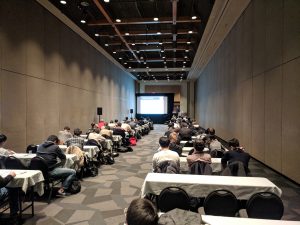 Audio Analysis Lab members Assistant Professors Jesper Rindom Jensen and Jesper Kjær Nielsen along with Professor Mads Græsbøll Christensen will be giving a tutorial at ICASSP 2018, which will be held in Calgary, Canada on April 15-20. The tutorial is entitled Model-based Speech and Audio Processing and is based on the lab’s work in various projects, including our work on pitch estimation, noise reduction, audio analysis, microphone arrays, etc. ICASSP, which is organized by the IEEE, is the top conference on signal processing in the world. You can read more about the tutorial using the following link:
Audio Analysis Lab members Assistant Professors Jesper Rindom Jensen and Jesper Kjær Nielsen along with Professor Mads Græsbøll Christensen will be giving a tutorial at ICASSP 2018, which will be held in Calgary, Canada on April 15-20. The tutorial is entitled Model-based Speech and Audio Processing and is based on the lab’s work in various projects, including our work on pitch estimation, noise reduction, audio analysis, microphone arrays, etc. ICASSP, which is organized by the IEEE, is the top conference on signal processing in the world. You can read more about the tutorial using the following link: 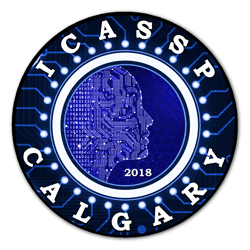 The 43rd IEEE International Conference on Acoustics, Speech and Signal Processing (ICASSP) 2018 will be held April 15-20, 2018 in Calgary, Canada. As usual, the Audio Analysis Lab will be present at the top signal processing conference in the world with the following papers that will be presented at the conference:
The 43rd IEEE International Conference on Acoustics, Speech and Signal Processing (ICASSP) 2018 will be held April 15-20, 2018 in Calgary, Canada. As usual, the Audio Analysis Lab will be present at the top signal processing conference in the world with the following papers that will be presented at the conference: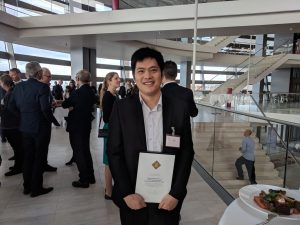 Audio Analysis Lab member Liming shi received a prestigious EliteForsk (Elite Research) Travel Stipend from the Ministry of Education and Science yesterday during the annual EliteForsk celebration at the beautiful Copenhagen Opera House. The stipends, which are awarded to current Ph.D. students in Denmark, consists of 200,000 DKK for visiting universities abroad and conference participation. The travel stipends are awarded by nomination and the candiates are evaluated by council members of Independent Research Fund Denmark. Only 20 of these highly competitive stipends are awarded annually, and only two were awarded to Ph.D. students at AAU. Liming Shi will be visiting Cambridge University, United Kingdom and Alto University, Finland. You can read more about the EliteForsk celebration
Audio Analysis Lab member Liming shi received a prestigious EliteForsk (Elite Research) Travel Stipend from the Ministry of Education and Science yesterday during the annual EliteForsk celebration at the beautiful Copenhagen Opera House. The stipends, which are awarded to current Ph.D. students in Denmark, consists of 200,000 DKK for visiting universities abroad and conference participation. The travel stipends are awarded by nomination and the candiates are evaluated by council members of Independent Research Fund Denmark. Only 20 of these highly competitive stipends are awarded annually, and only two were awarded to Ph.D. students at AAU. Liming Shi will be visiting Cambridge University, United Kingdom and Alto University, Finland. You can read more about the EliteForsk celebration 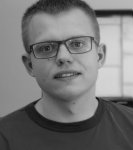 The Audio Analysis Lab is extremely proud to announce that founding member Assistant Professor Jesper Rindom Jensen has been accepted in AAU’s research talent program for younger researchers. The program is part of AAU’s strategy for 2016-2021 and provides funding for a research project proposed by the young researcher. This round of applications was extremely competitive and 10 out of 52 applications were approved by an independent evaluation committee. You can read more about the program and the young researchers who received funding
The Audio Analysis Lab is extremely proud to announce that founding member Assistant Professor Jesper Rindom Jensen has been accepted in AAU’s research talent program for younger researchers. The program is part of AAU’s strategy for 2016-2021 and provides funding for a research project proposed by the young researcher. This round of applications was extremely competitive and 10 out of 52 applications were approved by an independent evaluation committee. You can read more about the program and the young researchers who received funding  The Audio Analysis Lab presented two papers at the IEEE Workshop on Applications of Signal Processing to Audio and Acoustics, which was held October 15-18 at Mohonk Mountain House, New Paltz, New York. The lab was also part of the organizing team for this edition of the workshop, as Mads Græsbøll Christensen was Technical Program Co-Chair. The papers presented were:
The Audio Analysis Lab presented two papers at the IEEE Workshop on Applications of Signal Processing to Audio and Acoustics, which was held October 15-18 at Mohonk Mountain House, New Paltz, New York. The lab was also part of the organizing team for this edition of the workshop, as Mads Græsbøll Christensen was Technical Program Co-Chair. The papers presented were: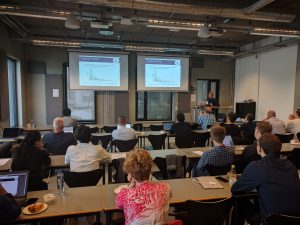 On August 24 2017, the Audio Analysis Lab’s annual workshop, called the Audio Analysis Workshop, was held at AD:MT in Rendsburggade 14 in Aalborg. This year’s edition is sponsored by the Independt Reserach Fund Denmark via our project on diagnosis of Parkinsons disease from voice signals. There were 25 participants from the lab, industrial partners, and universities abroad. The workshop featured 18 talks on ongoing research on topics such as frequency estimation, music signal modeling, distributed signal processing, Parkinsons, noise reduction, hearing aids, array processing, and speech intelligibility prediction. This was the sixth edition of the workshop which started in 2012 with the foundation of the Audio Analysis Lab.
On August 24 2017, the Audio Analysis Lab’s annual workshop, called the Audio Analysis Workshop, was held at AD:MT in Rendsburggade 14 in Aalborg. This year’s edition is sponsored by the Independt Reserach Fund Denmark via our project on diagnosis of Parkinsons disease from voice signals. There were 25 participants from the lab, industrial partners, and universities abroad. The workshop featured 18 talks on ongoing research on topics such as frequency estimation, music signal modeling, distributed signal processing, Parkinsons, noise reduction, hearing aids, array processing, and speech intelligibility prediction. This was the sixth edition of the workshop which started in 2012 with the foundation of the Audio Analysis Lab.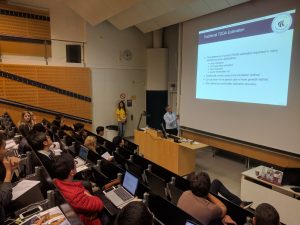 morning August 20, Audio Analysis Lab members Jesper Kjær Nielsen, Jesper Rindom Jensen, and Mads Græsbøll Christensen gave a three-hour tutorial at INTERSPEECH in Stockholm, Sweden. The tutorial was entitled Statistical Parametric Speech Processing: Solving Problems with the Model-based Approach and included a lot of the lab’s work in recent years on model-based methods for processing of speech and audio signals. The tutorial was popular with 70+ participants signed up! More info about the tutorial can be obtained
morning August 20, Audio Analysis Lab members Jesper Kjær Nielsen, Jesper Rindom Jensen, and Mads Græsbøll Christensen gave a three-hour tutorial at INTERSPEECH in Stockholm, Sweden. The tutorial was entitled Statistical Parametric Speech Processing: Solving Problems with the Model-based Approach and included a lot of the lab’s work in recent years on model-based methods for processing of speech and audio signals. The tutorial was popular with 70+ participants signed up! More info about the tutorial can be obtained 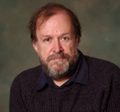 Professor Barry Quinn will be visiting the Audio Analysis Lab this fall as Guest Professor. He is Professor of Statistics, Dept. of Statistics, Macquarie University, Sydney, Australia. In the signal processing community, he is well-known for his fundamental work on autoregressive processes, frequency estimation and order estimation. While visiting Aalborg University, he will be working with the member of Audio Analysis Lab on our various research projects and will giving a Ph.D. course entitled The Estimation of Frequency. Course details can be found at
Professor Barry Quinn will be visiting the Audio Analysis Lab this fall as Guest Professor. He is Professor of Statistics, Dept. of Statistics, Macquarie University, Sydney, Australia. In the signal processing community, he is well-known for his fundamental work on autoregressive processes, frequency estimation and order estimation. While visiting Aalborg University, he will be working with the member of Audio Analysis Lab on our various research projects and will giving a Ph.D. course entitled The Estimation of Frequency. Course details can be found at